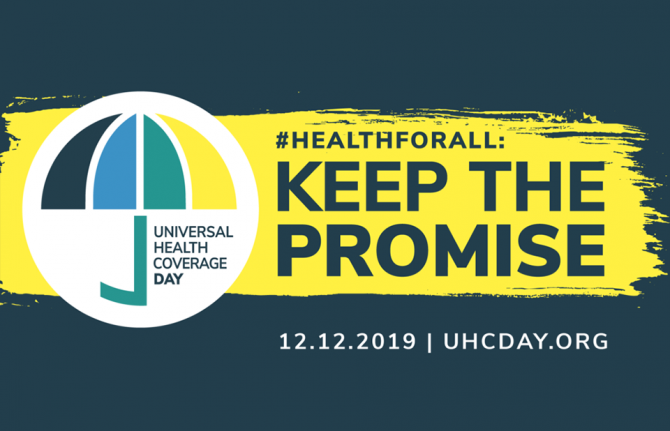

Press Statement
UNAIDS Executive Director's message on Universal Health Coverage Day
12 December 2019 12 December 201912 December 2019
On Universal Health Coverage Day, I stand in solidarity with all people who lack access to the health services that they need. Today, 10 000 of those people will die. Every two minutes, a woman will die giving birth. And every second, three people will be pushed into extreme poverty paying for health care. Today, those with the greatest need for health care are the least likely to get it. This must change, and it must change fast.
Universal health coverage is a human right that belongs to everyone on this planet. No matter who they are or where they live, everyone has the right to access quality health services without facing financial hardship. This was the historic commitment made by United Nations Member States in the political declaration made at the first-ever high-level meeting on universal health coverage last September.
Universal health coverage is central to our time and to the AIDS response, because better health outcomes are, first and foremost, about addressing inequities. Evidence that health coverage has truly become universal will be in improved health and in the elimination of the unacceptable inequality in health outcomes for the most marginalized populations. It will be the day when no parent has to make a choice between which child they will save because the cost of treatment is too high.
Each year, 100 million people are pushed into extreme poverty and 900 million face severe financial hardship paying for their health care. Despite commitments to bring these figures down, alarmingly they are on the rise. The fastest increase is in Africa, where two thirds of countries still charge user fees for all levels of care. This must change. User fees trap people, especially women and children, in cycles of poverty, illness and powerlessness. It is an injustice to force people to choose between paying for food, education or the health services they need. It is a human rights violation to detain patients in hospitals when they can’t afford their bill. Universal health coverage must lift the financial barriers to accessing health care. To ensure that rights are upheld and lives are saved, quality health care should be made available at the point of use for all people.
But universal health coverage needs also to go beyond the health sector, to address the social, economic and structural determinants of health, such as poverty, lack of formal education, gender inequality and gender-based violence. Similarly, it must ensure that vulnerable and key populations are not excluded from accessing health services owing to legal barriers or stigma and discrimination because of who they are.
The AIDS response has taught us that community-led organizations are central to any effective health system. A few days ago, we commemorated World AIDS Day with a call to recognize that communities make the difference. If today more than 24 million people have access to HIV treatment, it is first and foremost thanks to the work of those communities to advocate, deliver services and hold systems accountable.
For universal health coverage to achieve measurable health outcomes, it must fund and include community-led services. Communities need to be at the centre, involved in each step of health governance, planning, implementation, monitoring, reporting and research.
In recognizing the theme of this year’s Universal Health Coverage Day, “Keep the promise”, I call on governments and communities to keep up the momentum generated by the commitment in the political declaration and work together to advance equitable quality health services that reach the people in need and improve their well-being. This will be essential to both ending AIDS and the achievement of the Sustainable Development Goals.
Winnie Byanyima
Executive Director of UNAIDS
Under-Secretary-General of the United Nations
UNAIDS
The Joint United Nations Programme on HIV/AIDS (UNAIDS) leads and inspires the world to achieve its shared vision of zero new HIV infections, zero discrimination and zero AIDS-related deaths. UNAIDS unites the efforts of 11 UN organizations—UNHCR, UNICEF, WFP, UNDP, UNFPA, UNODC, UN Women, ILO, UNESCO, WHO and the World Bank—and works closely with global and national partners towards ending the AIDS epidemic by 2030 as part of the Sustainable Development Goals. Learn more at unaids.org and connect with us on Facebook, Twitter, Instagram and YouTube.
Contact
UNAIDS GenevaAnne-Claire Guichard
tel. +41 22 791 2321
guicharda@unaids.org
UNAIDS Media
tel. +41 22 791 42 37
communications@unaids.org
Learn more about
Press centre
Download the printable version (PDF)
